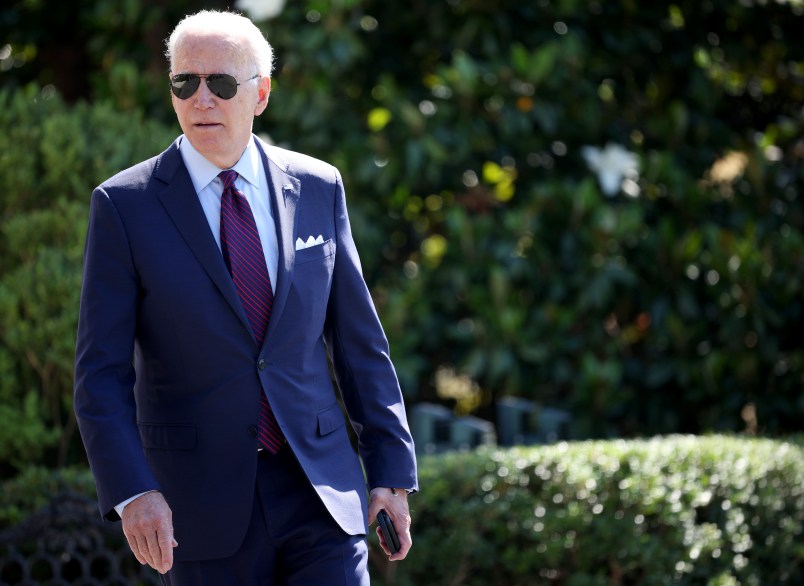President Joe Biden expressed his “deep disappointment” with the Supreme Court’s major voting rights case decision Thursday, in which the six conservative justices further weakened the Voting Rights Act.
All three liberal justices dissented, led by Justice Elena Kagan who wrote a lengthy lamentation about the majority’s decision and Court’s history of helping keep minority voters from the ballot box.
“In a span of just eight years, the Court has now done severe damage to two of the most important provisions of the Voting Rights Act of 1965 — a law that took years of struggle and strife to secure,” Biden wrote in a statement.
He reemphasized the need to pass federal voting safeguards: namely, the sweeping democracy reform package called the For The People Act and legislation meant to restore the Voting Rights Act to its full power, the John Lewis Voting Rights Act. The For the People Act was most recently filibustered by Republicans in the Senate, and the John Lewis Act likely faces the same fate once it’s completed later this year.
The House Judiciary Committee leaders shepherding through the John Lewis Act said in a statement after the Court’s decision that the committee will “expeditiously complete its work on an updated John R. Lewis Voting Rights Advancement Act and move to bring legislation to the House floor as quickly as possible.”
Anti-filibuster activists have rallied behind the legislation to make their case, arguing that the two bills are all the more urgent as GOP-led state legislatures push a raft of restrictive voting laws in the wake of the 2020 election. The power to eliminate the Senate rule lays with the only current Democratic holdouts, Sens. Joe Manchin (D-WV) and Kyrsten Sinema (D-AZ), who have both recently reaffirmed their loyalty to the measure, which acts as a virtual minority veto.
“The Court’s decision, harmful as it is, does not limit Congress’ ability to repair the damage done today,” Biden writes. “That means forging a coalition of Americans of every background and political party — from advocates, activists, and business executives — to raise the urgency of the moment and demand that our democracy truly reflects the will of the people and that it delivers for the Nation.”







So now comes the grand re-build to try, with S1 and the John Lewis bill, to repair the damage inflicted by the court.
But let’s suggest for a moment that both bills pass. Pass in their current forms.
Knowing what they know about the court’s leaning, what’s to say the GQP doesn’t start litigation that goes all the way to SCOTUS and SCOTUS deems these bills unconstitutional, or whatever, and further de-fangs voting rights in the nation? The court isn’t subject to voting laws, but their benefactors are.
I don’t see any clear way to getting voting rights back to where they were or should be, with the current court makeup and the amount of money the GQP is pouring into ensuring their rule for generations to come.
Munchkin and Cinema: “Sure, sure, all those people in the burning building will die if we don’t get them out – but only Democratic firefighters are brave enough to rush into the flames and smoke – and that would be ‘partisan’. Better to let them all die unless we come up with a ‘bipartisan’ rescue squad.”
(“After all, if we eliminate the filibuster, then some future, hypothetical GOP majority might – possibly, conceivably, maybe – do something ‘bad’ that we can’t even realistically point to, because we’re just speculatively self-pleasuring with our obstinance.”)
This will increase the pressure to pass S1.
Pressure from outside the BeltWay
The court didn’t do it alone. It’s only after the hammer-and-chisel crew gives them something to chip away on that they go to work with their rasps and sandpaper and Shinola.
It’s also a given that Rethugliklans will start litigating anew peoples’ right to vote if both bills pass. It’s their only other chance (outside of gerrymandering) to win anything anymore with even a veneer of legitimacy.
Some clever person will figure out that the 13th amendment is invalid because several of the States needed to approve it were occupied States under Reconstruction at the time, so that’s a ton of people who shouldn’t even be free, let alone voting.
And 5 Supremes will be fine with that argument.